Nurturing Active Children A Guide to Physical Health Management
Introduction:
Active children are a delight to watch as they explore the world around them. However, their boundless energy can sometimes lead to physical strain and health concerns. As parents and caregivers, it's essential to understand how to manage and nurture the bodies of these energetic young ones. This article will provide practical tips and advice on how to ensure that active children maintain a healthy lifestyle.
1. Encourage a Balanced Diet:
Active children require a balanced and nutritious diet to fuel their energy levels and support their growth. Here are some dietary recommendations:
a. High-protein foods: Eggs, lean meats, fish, and legumes are excellent sources of protein, which help in muscle repair and development.
b. Whole grains: Incorporate whole grains such as brown rice, whole-wheat bread, and oatmeal into their diet for sustained energy levels.
c. Fruits and vegetables: A variety of fruits and vegetables will provide essential vitamins, minerals, and fiber to keep their bodies healthy.
d. Healthy fats: Avocado, nuts, and seeds are rich in healthy fats that aid in brain development and overall health.
2. Prioritize Hydration:
Dehydration can lead to fatigue, reduced performance, and even heat-related illnesses. Ensure your child stays hydrated by:
a. Providing plenty of water throughout the day.

b. Encourage them to drink water before, during, and after physical activities.
c. Offer flavored water or infused water to make hydration more appealing.
3. Develop a Routine:
Creating a daily routine can help manage your child's energy levels and ensure they receive adequate rest and recovery. Here's a suggested routine:
a. Early morning: A healthy breakfast rich in protein and whole grains to kickstart their day.
b. Mid-morning: A short break for a healthy snack, such as fruit or yogurt.
c. Afternoon: A mix of physical activity, such as play, sports, or outdoor games, followed by a nutritious snack.
d. Early evening: A balanced dinner with a focus on protein, whole grains, and vegetables.
e. Bedtime: A calming routine, such as reading or a warm bath, to prepare them for sleep.
4. Promote Regular Physical Activity:
Physical activity is crucial for active children. Encourage a mix of activities that cater to their interests and energy levels:
a. Organized sports: Joining a sports team can provide structure and help develop teamwork and discipline.
b. Outdoor play: Encourage them to engage in outdoor activities such as cycling, hiking, or swimming.
c. Unstructured play: Allow them to explore and play freely in their environment, as this fosters creativity and problem-solving skills.
5. Monitor Their Sleep:
Adequate sleep is essential for children's growth and development. Ensure your child gets enough sleep by:
a. Establishing a consistent bedtime routine.
b. Creating a comfortable sleep environment, free from electronic devices.
c. Keeping their bedroom dark, quiet, and at a comfortable temperature.
6. Schedule Regular Health Check-ups:
Regular health check-ups with a pediatrician will help identify any potential health issues early on. Discuss with your healthcare provider about:
a. Growth and development milestones.
b. Nutritional needs and any dietary concerns.
c. Physical fitness and activity levels.
Conclusion:
Active children need proper care and attention to ensure they maintain a healthy lifestyle. By focusing on a balanced diet, hydration, a consistent routine, physical activity, and regular health check-ups, you can help your child thrive and grow into a strong, healthy individual. Remember, the key is to find a balance that allows your child to enjoy their energy while also prioritizing their well-being.









